Antim, India's first U20 world champion
Friday, August 19, 2022 - 20:53 By Vinay Siwach

SOFIA, Bulgaria (August 19) -- Her name may translate to 'the last', but ANTIM (IND) did a first for India.
Before Antim, six Indian wrestlers reached the finals at the previous U20 World Championships, but it took the 17-year-old to win the country's first-ever gold medal at the tournament.
Not only did she win the gold, but she also ran through the 53kg weight class. She defeated U20 European champion Amory ANDRICH (GER) 11-0 in the first round, pinned Ayaka KIMURA (JPN) in the quarterfinal and won via technical superiority against Nataliia KLIVCHUTSKA (UKR) in the semifinal.
"Everyone always said that Japan is the best," Antim said. "All I wanted to do was beat Japan."
In the final, Antim destroyed Alytn SHAGAYEVA (KAZ) 8-0, using her counters to perfection. She began with a double leg attack and then went for an outside head for another takedown. At the break, Antim had a 6-0 lead.
With the bout under control, the Tunis Ranking Series champion was happy to play out the three minutes and only scored one takedown.
"I really love counters but here she was not attacking much so I had to initiate a few attacks," she said.
Born after three daughters to Ram Niwas Panghal and Krishna Kumari, the parents decided to name her Antim hoping that it would be their last daughter. Little did the Panghal household know in 2004 that Antim will, one day, be the first in the world.
"My elder sister plays kabaddi and she was the one who forced my parents to let me wrestle," she said. "But they never stopped me or pulled me down. My parents have contributed to this success.
"We moved closer to the academy and stayed at a rented place. Now we are building our own house. I don't like staying in the academy."
Though Antim, who celebrates her 18th birthday on August 31, had collected titles at various age-group nationals, she made news after the selection trials for the Commonwealth Games in June.
In the final, she wrestled world bronze medalist Vinesh PHOGAT (IND) and was leading 3-1 till the final 10 seconds when Phogat used a seatbelt for exposure to win 3-3.
"I wrestled Vinesh without any pressure because my coach had told me that it doesn't matter if I win or lose," she said. "I am way younger than Vinesh so it didn't matter."
 ANTIM (IND) scores a takedown against Alytn SHAGAYEVA (KAZ) in the 53kg final. (Photo: UWW / Kostadin Andonov)
ANTIM (IND) scores a takedown against Alytn SHAGAYEVA (KAZ) in the 53kg final. (Photo: UWW / Kostadin Andonov)
But when she was selected for the U20 Worlds in Sofia, Antim wanted to win the gold, a medal she missed at the U17 World Championships last year. In Budapest, she finished with a bronze after a 4-3 loss to Katie GOMEZ (USA), who won a bronze medal in Sofia on Friday.
"I didn't think too much about that loss," she said. "I moved on and thought of winning in the next World Championships."
Although a year later, Antim did achieve the goal she set and made it even sweeter.
"I knew it [first gold]," she said. "My coach had told me that if I win, my name will be in the history books."
 Nonoka OZAKI (JPN) pins Sonam MALIK (IND) in the 62kg final. (Photo: UWW / Kadir Caliskan)
Nonoka OZAKI (JPN) pins Sonam MALIK (IND) in the 62kg final. (Photo: UWW / Kadir Caliskan)
India had two more wrestlers in the final on Friday but they failed to cross the Japan hurdle for the gold medal.
Senior World bronze medalist Nonoka OZAKI (JPN) won the 62kg gold medal by beating two-time U17 world champion Sonam MALIK (IND).
"She's an opponent I've been facing since my cadet [U17] days," Ozaki said. "I know what her wrestling style is. I'm happy that I was able to do what I wanted to do on the big stage of the final."
Ozaki shot for the leg and stood up for the lace. Instead of going for turns she put Malik on her back and secured the fall.
Three years back, Ozaki had won her first world title in Sofia and said the place brought back sweet memories.
"I've already been to the senior Asian Championships and World Championships, so I feel that I definitely should win at this age group," she said. "This is my second time in Bulgaria. I'm really happy to win again here, and it brought back memories of my U17 gold medal."
For Ozaki, who will be in Belgrade for the senior Worlds, wrestling at the U20 level was important to get international exposure before the big tour in which she will try to step on the top of the podium.
"Even though we will be heading out next month, before the World Championships I wanted to compete here and get a feel for facing foreign wrestlers," she said.
"From the time I return to Japan, up to the World Championships, there is not much time," she said. "I wanted to use this tournament for self-reflection and to build a little strength, so in the end, I'm in top shape going into the tournament."
 Nonoka OZAKI (JPN) celebrates after winning the gold medal in Sofia. (Photo: UWW / Kadir Caliskan)
Nonoka OZAKI (JPN) celebrates after winning the gold medal in Sofia. (Photo: UWW / Kadir Caliskan)
It will be her second senior World Championships but the first in which she is the favorite to win the gold. Last year in Oslo, Ozaki suffered an opening round loss to world champion Aisuluu TYNYBEKOVA (KGZ). Though she avenged that loss in the Asian Championships final, Ozaki believes that Tynybekova remains her toughest opponent.
"Aisuluu," she said when asked about her toughest opponent in Belgrade. "At the Asian Championships, my opponent hurt her ankle. This time it will certainly be a tough match. I will be sure not to let my guard down and go for a solid win.
"The wrestlers entered at the World Championships have power and many techniques. I've watched many videos, and I've rethought how my wrestling can work against the overseas wrestlers."
Ozaki's ultimate aim is to win the Olympic gold medal. But for that, she will have to go through rounds of selection process beginning with the Emperor's Cup in December this year. Earlier in May, she defeated Olympic champion Yukako KAWAI (JPN) to win the Meiji Cup and book the ticket to Belgrade.
But the 19-year-old says that living in the past will not help her cause.
"The match [against Kawai in May] was for qualifying for Serbia, not the Olympics," she said. "If I don't win the Emperor's Cup in December and the Meiji Cup next year, I can't make the team to the World Championships and can't secure a place at the Olympics. I've put the win over Kawai in the past and now I'm thinking of how I can beat her the next time."
 Mahiro YOSHITAKE (JPN) controls an attack from PRIYANKA (IND) in the 65kg final. (Photo: UWW / Kostadin Andonov)
Mahiro YOSHITAKE (JPN) controls an attack from PRIYANKA (IND) in the 65kg final. (Photo: UWW / Kostadin Andonov)
In another Japan-India final, Mahiro YOSHITAKE (JPN) showed some top defense to overcome PRIYANKA (IND), 8-0, in the 65kg final.
Priyanka tried shooting for Yoshitake's leg but she was countered by the Japanese with ease. She built on her 2-0 lead and extended it to 4-0 in the second period with a takedown before a go-behind and lace made it 8-0, the final score.
Yoshitake was wrestling at her first World Championships but showed no sign of inexperience, dominating all her bouts and giving up only two points in four bouts.
 Ruka NATAMI (JPN) won the 57kg gold medal in Sofia. (Photo: UWW / Kostadin Andonov)
Ruka NATAMI (JPN) won the 57kg gold medal in Sofia. (Photo: UWW / Kostadin Andonov)
The third gold for Japan was won by Ruka NATAMI (JPN), another U17 world champion from Sofia in 2019. She wrestled Sofia MACALUSO (USA) in the 57kg final and controlled the final from the first whistle until the end winning 6-1.
Only senior European silver medalist Oleksandra KHOMENETS (UKR) was able to score on Natami. But the Japan wrestler scored a final second exposure to beat Khomenets in the quarterfinals.
The three golds and two bronze medals on Friday along with the five golds on Thursday helped Japan win the title with 230 points. It finished 70 points ahead of second-placed India. The defending champion the USA finished third with 134 points.
 Amit ELOR (USA) repeated as the U20 world champion. (Photo: UWW / Kadir Caliskan)
Amit ELOR (USA) repeated as the U20 world champion. (Photo: UWW / Kadir Caliskan)
Elor repeats
The USA received a huge boost in the team race when returning champion Amit ELOR (USA) won her second straight gold medal at the U20 Worlds.
Last year, she won the gold at 68kg but jumped up to 72kg for this edition. But there was no change in the performance as she managed to ease her way to the gold medal.
Wrestling Anastassiya PANASSOVICH (KAZ) in the final, Elor defended a few upper-body locks early in the bout before countering them for takedowns.
Elor, who won a bronze medal in the 2019 U17 Worlds in Sofia, made it look easy against Panassovich and showed that she is ready for the senior Worlds in Belgrade.
"It's hard to believe that I won another world title," Elor said. "I am still shocked but it's just another match.
"I took a close loss in the U17 Worlds in Sofia. Ever since then, I remember that moment. [At] every tough practice, I remember that loss, and I am like if only I worked a little harder, those last two seconds. I keep imagining that in practice and it has helped me become a lot stronger wrestler both physically and mentally."
Elor will now head to Belgrade to win her first senior-level medal before moving to Spain for the U23 World Championships.
"[I learned] how to handle stress at an international competition," she said. "Every time I wrestle internationally I think I can handle it better. I will take my experiences here and try to use them in the upcoming World Championships."
 Abolfazl CHOUBANI (IRI) won the semifinal against Lachin VALIYEV (AZE). (Photo: UWW / Kostadin Andonov)
Abolfazl CHOUBANI (IRI) won the semifinal against Lachin VALIYEV (AZE). (Photo: UWW / Kostadin Andonov)
Iran puts 3 in Greco finals
Greco-Roman wrestling began at the U20 World Championships on Friday with five weight classes. Iran emerged as the most successful team with three wrestlers in the gold medal bouts.
At 63kg, Iman Khoon MOHAMMADI (IRI) gave no chance to Chiezo MARUYAMA (JPN) and won the semifinal 4-0 with ease. He will now wrestle Baiaman KARIMOV (KGZ) who defeated Arman VARDANYAN (ARM), 3-2 in the other semifinal.
Karimov trailed 2-0 after the first period was Vardanyan was called passive and Karimov got the turn from par terre to lead 3-2.
A rematch of the U20 European semifinal at 87kg was on the cards as Vigen NAZARYAN (ARM) made the final in Sofia by beating Maksat SAILAU (KAZ), 9-0, but Abolfazl CHOUBANI (IRI) build an 8-1 lead over European champion Lachin VALIYEV (AZE) before the Azerbaijan wrestler was forced to retire due to injury.
Valiyev twisted his ankle in the first minute of the bout and wrestled in pain until he was officially told to not continue the bout.
The 130kg final will feature U20 European and Asian champions. Mykhailo VYSHNYVETSKYI (UKR) and Fardin HEDAYATI (IRI) won their respective semifinal in contrasting fashion.
Vyshnyvetskyi thrashed Aden ATTAO (USA) 10-0 in the semifinals using two four-point throws. Hedayati struggled but beat Temurbek NASIMOV (UZB), 5-1.
At 55kg, the final will be a repeat of the U20 European Championships final between Nihad GULUZADE (AZE) and Denis MIHAI (ROU). The Romania wrestler will be keen on avenging his loss from the final in Rome.
In the semifinal, Mihai got the par terre position against '21 U17 world champion Nuristan SUIORKULOV (KGZ) and hit a four to lead 5-0 at the break. Suiorkulov failed to score from par terre in the second period.
Guluzade planned his semifinal to perfection against Karapet MANVELYAN (ARM). After giving up a point for passivity, he defended par terre and scored a stepout to lead 1-1 at the break. He then extended his lead to 2-1 with passivity in the second period. Manvelyan defended the position but Guluzade was happy to win 2-1.
Yuksel SARICICEK (TUR) reached the 77kg final after avenging his loss from the U20 European Championships against Alexandrin GUTU (MDA) in some manner, using two big throws to win via technical superiority. Gutu was put in par terre and Saricicek managed to lift him for a four before adding another four from the zone.
The U20 European bronze medalist will now wrestle the other bronze medalist from Rome, Deni NAKAEV (GER) in the final. Nakaev defeated U20 Asian silver medalist Samandar BOBONAZAROV (UZB), 9-4.
RESULTS
Women's wrestling
53kg
GOLD: Antim PANGHAL (IND) df. Altyn SHAGAYEVA (KAZ), 8-0
BRONZE: Ayaka KIMURA (JPN) df. Nataliia KLIVCHUTSKA (UKR), 6-4
BRONZE: Katie GOMEZ (USA) df. Shaimaa MOHAMED (EGY), 12-2
57kg
GOLD: Ruka NATAMI (JPN) df. Sofia MACALUSO (USA), 6-1
BRONZE: Oleksandra KHOMENETS (UKR) df. Zeinep BAYANOVA (KAZ), 12-2
BRONZE: SITO (IND) df. Melda DERNEKCI (TUR), via fall (11-5)
62kg
GOLD: Sonam MALIK (IND) df. Nonoka OZAKI (JPN), via fall (6-0)
BRONZE: Adaugo NWACHUKWU (USA) df. Bermet NURIDIN KYZY (KGZ), 10-0
BRONZE: Iryna BONDAR (UKR) df. Birgul SOLTANOVA (AZE), 9-1
65kg
GOLD: Mahiro YOSHITAKE (JPN) df. PRIYANKA (IND), 8-0
BRONZE: Dilnaz SAZANOVA (KGZ) df. Gulmira AITMURATOVA (UZB), 12-2
BRONZE: Khadija JLASSI (TUN) df. Reese LARRAMENDY (USA), 9-2
72kg
GOLD: Amit ELOR (USA) df. Anastassiya PANASSOVICH (KAZ), 10-0
BRONZE: Sumire NIIKURA (JPN) df. Vanesa GEORGIEVA (BUL), 4-1
BRONZE: REETIKA (IND) df. Zaineb SGHAIER (TUN), 4-3

Greco-Roman semifinals
55kg
GOLD: Nihad GULUZADE (AZE) vs. Denis MIHAI (ROU)
SF 1: Nihad GULUZADE (AZE) df. Karapet MANVELYAN (ARM), 2-1
SF 2: Denis MIHAI (ROU) df. Nuristan SUIORKULOV (KGZ), 5-1
63kg
GOLD: Iman Khoon MOHAMMADI (IRI) vs. Baiaman KARIMOV (KGZ)
SF 1: Iman Khoon MOHAMMADI (IRI) df. Chiezo MARUYAMA (JPN), 4-0
SF 2: Baiaman KARIMOV (KGZ) df. Arman VARDANYAN (ARM), 3-2
77kg
GOLD: Yuksel SARICICEK (TUR) vs. Deni NAKAEV (GER)
SF 1: Yuksel SARICICEK (TUR) df. Alexandrin GUTU (MDA), 10-0
SF 2: Deni NAKAEV (GER) df. Samandar BOBONAZAROV (UZB), 9-4
87kg
GOLD: Abolfazl CHOUBANI (IRI) vs. Vigen NAZARYAN (ARM)
SF 1: Abolfazl CHOUBANI (IRI) df. Lachin VALIYEV (AZE), 8-1 (via injury)
SF 2: Vigen NAZARYAN (ARM) df. Maksat SAILAU (KAZ), 9-0
130kg
GOLD: Mykhailo VYSHNYVETSKYI (UKR) vs. Fardin HEDAYATI (IRI)
SF 1: Mykhailo VYSHNYVETSKYI (UKR) df. Aden ATTAO (USA), 10-0
SF 2: Fardin HEDAYATI (IRI) df. Temurbek NASIMOV (UZB), 5-1



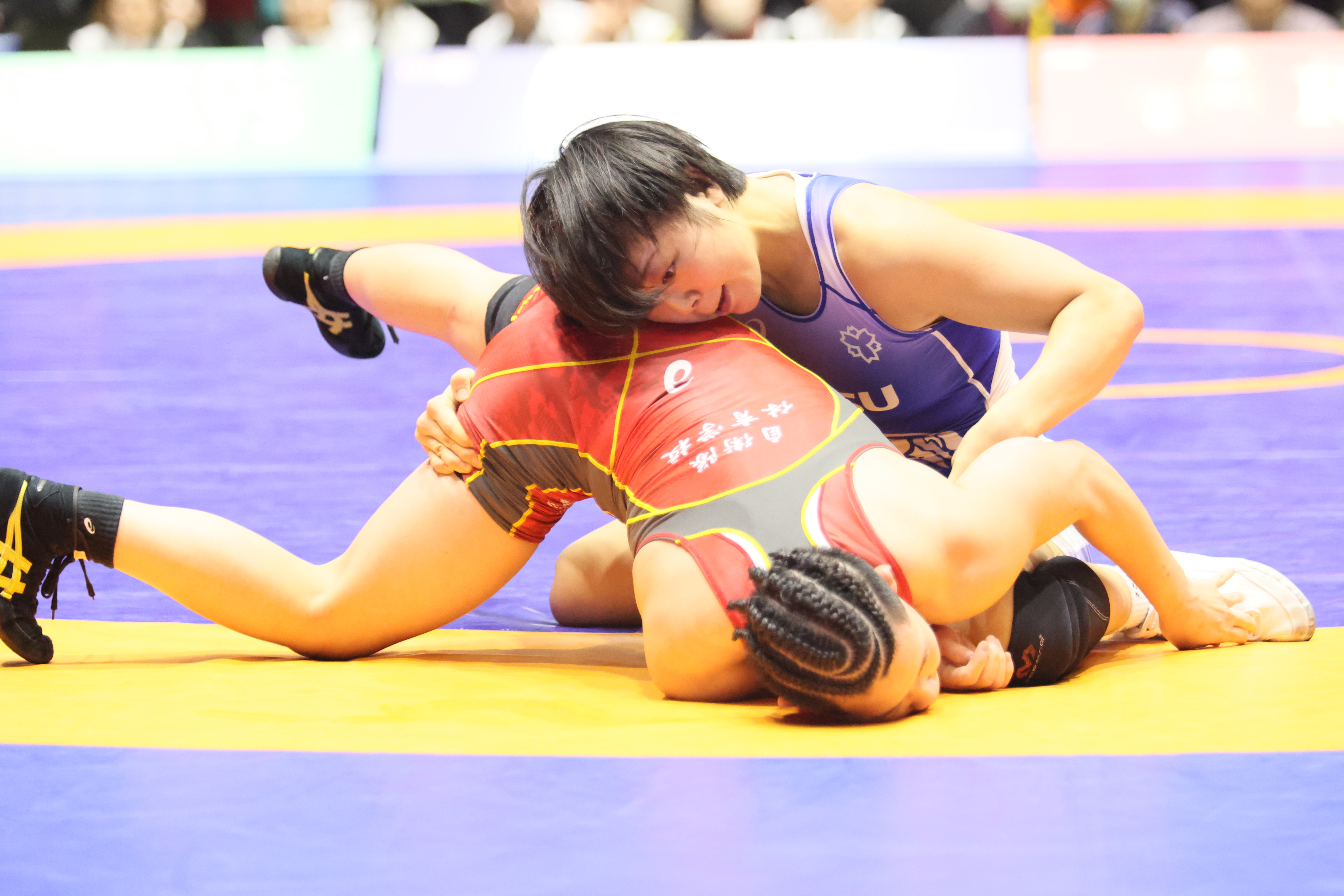 Akari FUJINAMI finishes up the winning takedown against Himeka TOKUHARA in the final minute of the women's 57kg final. (Photo: Takeo Yabuki / wrestling-spirits.jp)
Akari FUJINAMI finishes up the winning takedown against Himeka TOKUHARA in the final minute of the women's 57kg final. (Photo: Takeo Yabuki / wrestling-spirits.jp)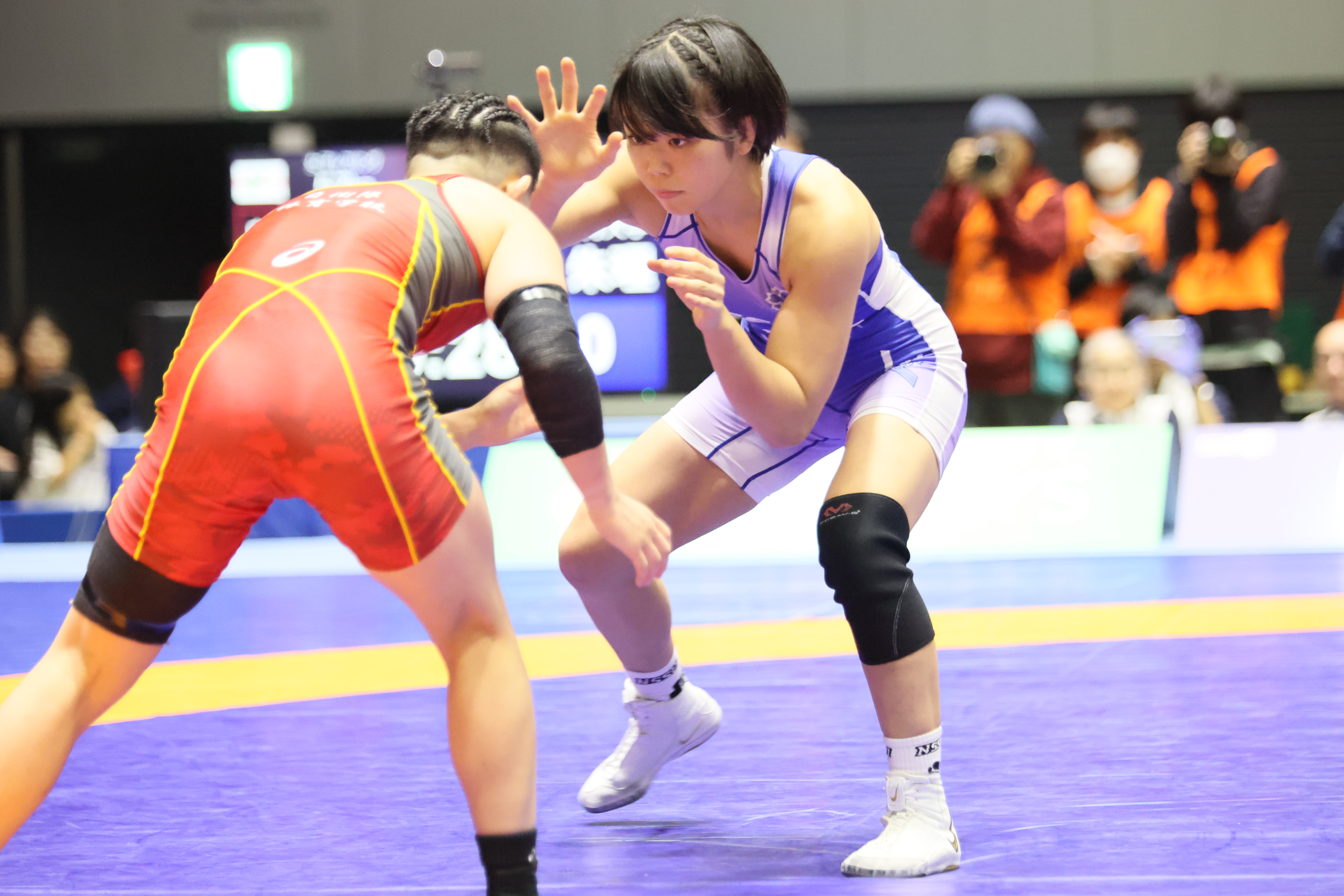 Akari FUJINAMI squares off with Himeka TOKUHARA in the women's 57kg final. (Photo: Takeo Yabuki / wrestling-spirits.jp)
Akari FUJINAMI squares off with Himeka TOKUHARA in the women's 57kg final. (Photo: Takeo Yabuki / wrestling-spirits.jp)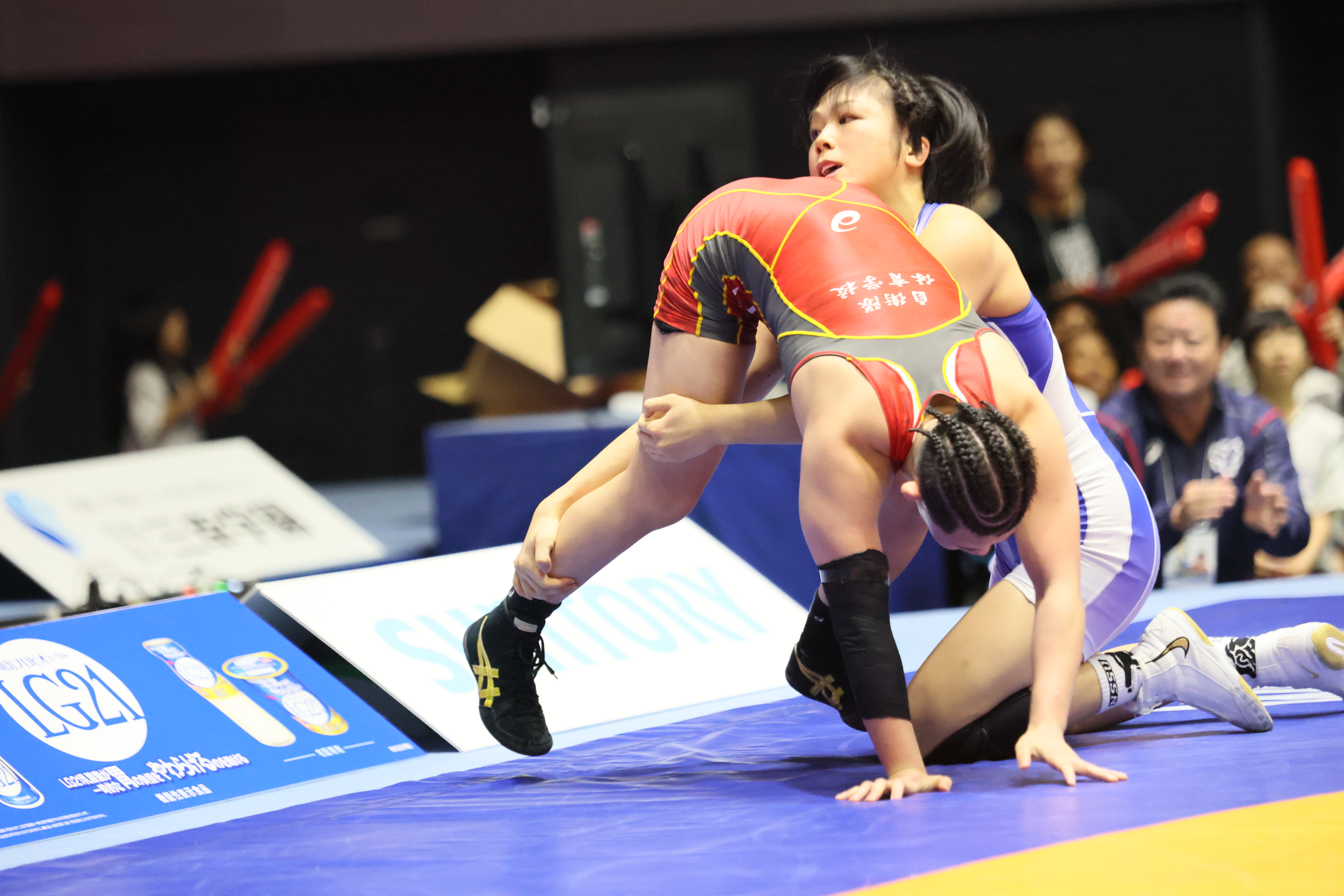 Akari FUJINAMI gets a stepout in the second period of the women's 57kg final. (Photo: Takeo Yabuki / wrestling-spirits.jp)
Akari FUJINAMI gets a stepout in the second period of the women's 57kg final. (Photo: Takeo Yabuki / wrestling-spirits.jp)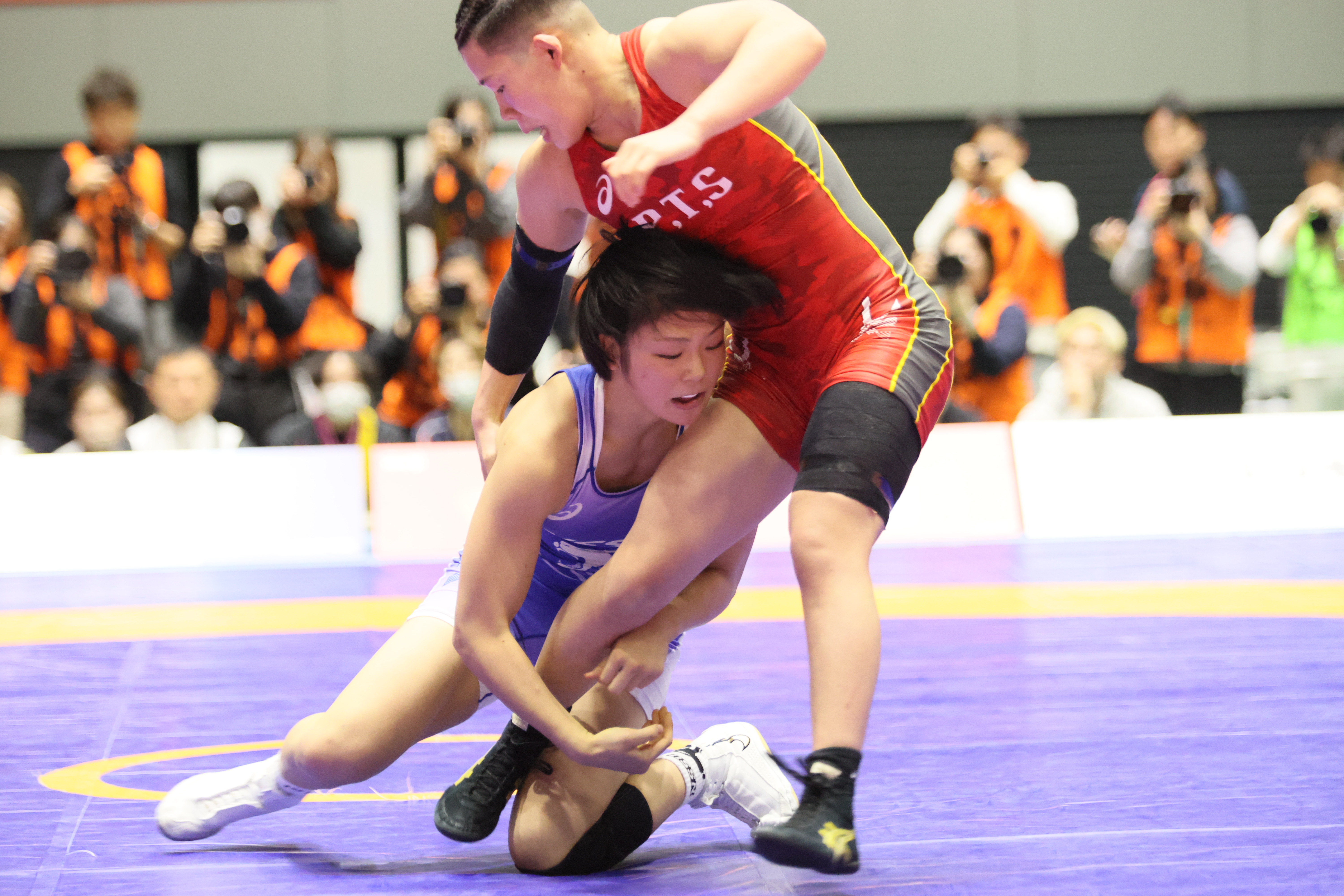 Akari FUJINAMI shoots for the winning takedown against Himeka TOKUHARA in the final minute of the women's 57kg final. (Photo: Takeo Yabuki / wrestling-spirits.jp)
Akari FUJINAMI shoots for the winning takedown against Himeka TOKUHARA in the final minute of the women's 57kg final. (Photo: Takeo Yabuki / wrestling-spirits.jp)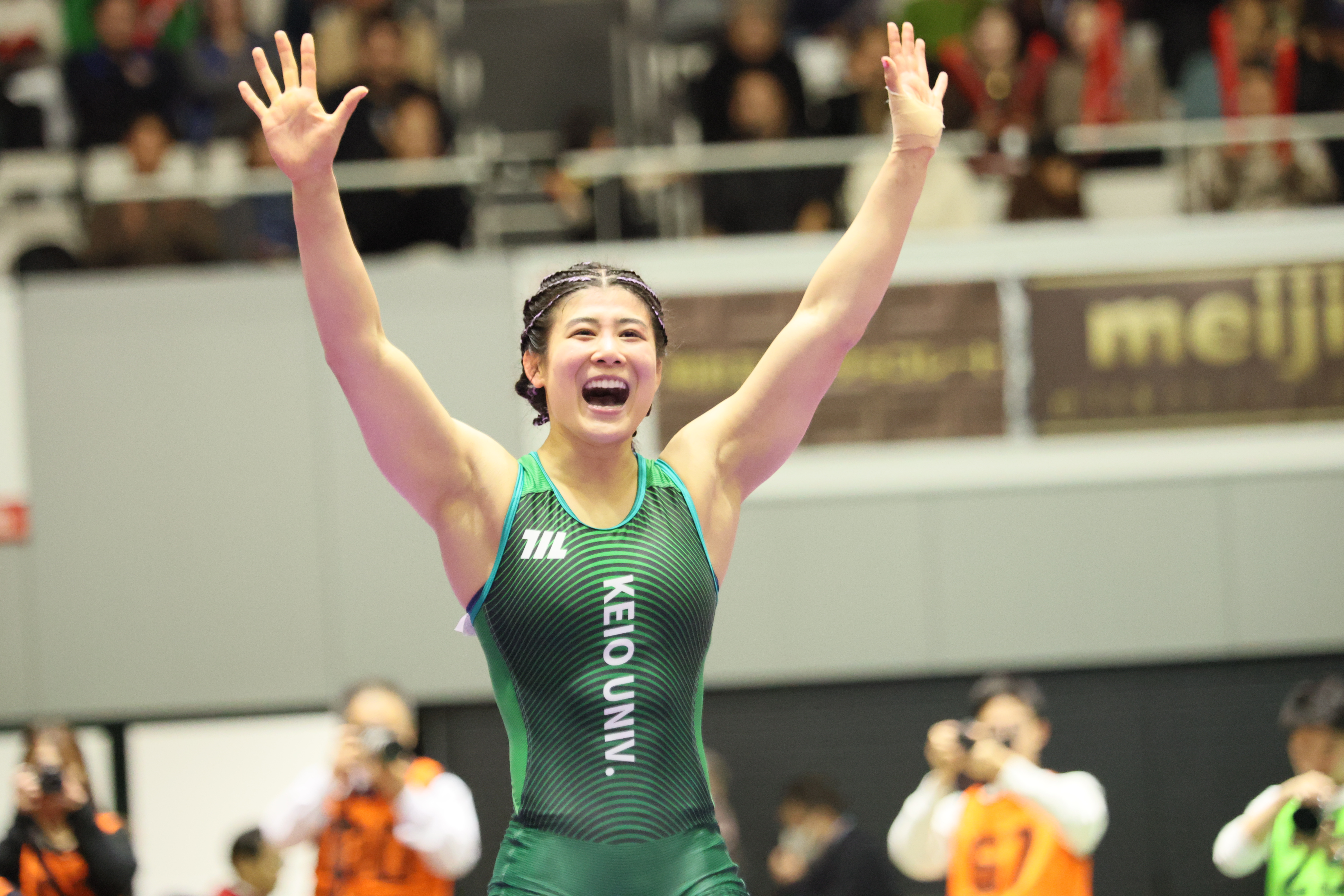 Nonoka OZAKI celebrates her victory over nemesis and Olympic champion Sakura MOTOKI in the women's 62kg final. (Photo: Takeo Yabuki / wrestling-spirits.jp)
Nonoka OZAKI celebrates her victory over nemesis and Olympic champion Sakura MOTOKI in the women's 62kg final. (Photo: Takeo Yabuki / wrestling-spirits.jp)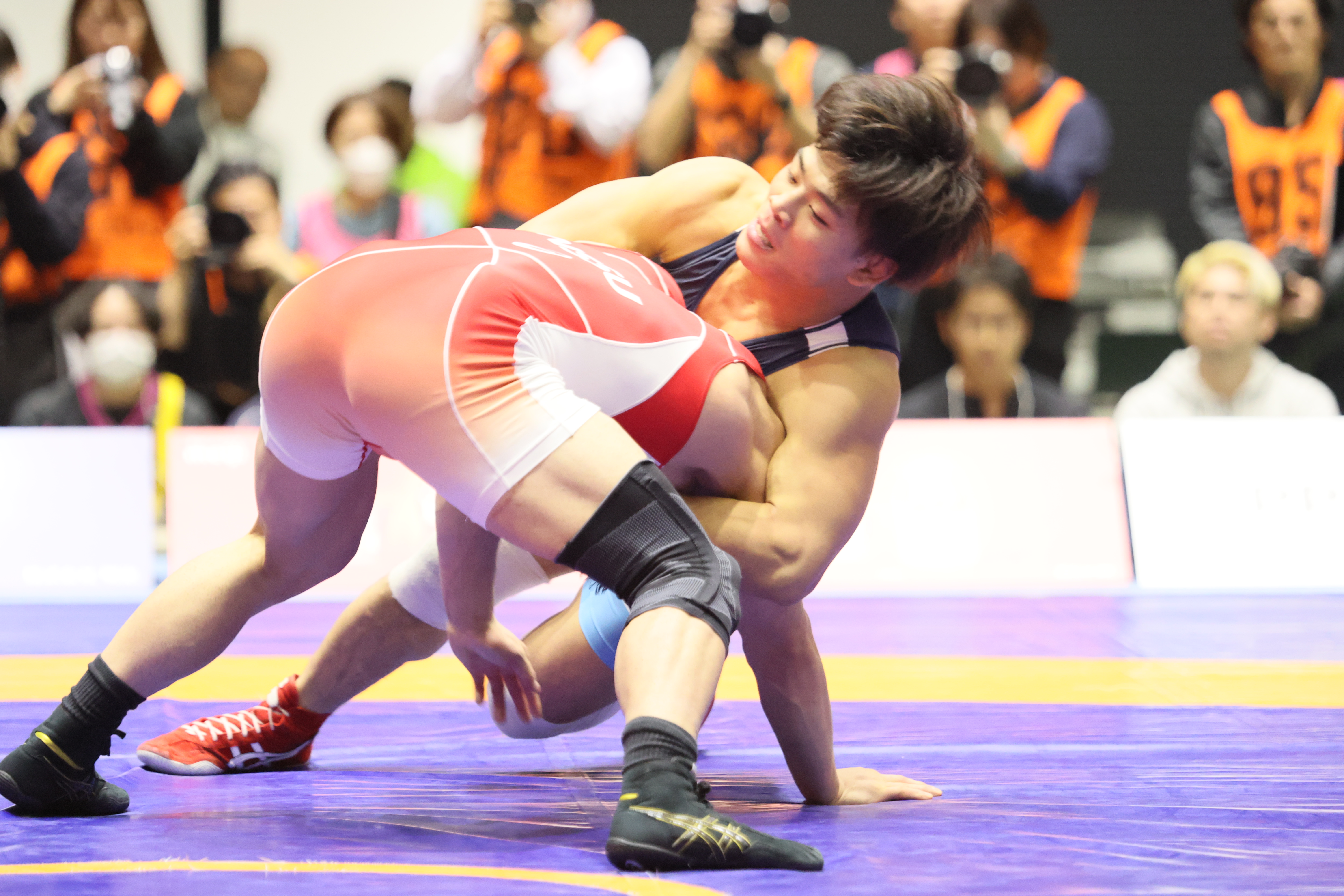 Yoshinosuke AOYAGI unsuccessfully attempts a front body lock roll in the freestyle 74kg final against Kota TAKAHASHI. (Photo: Takeo Yabuki / wrestling-spirits.jp)
Yoshinosuke AOYAGI unsuccessfully attempts a front body lock roll in the freestyle 74kg final against Kota TAKAHASHI. (Photo: Takeo Yabuki / wrestling-spirits.jp)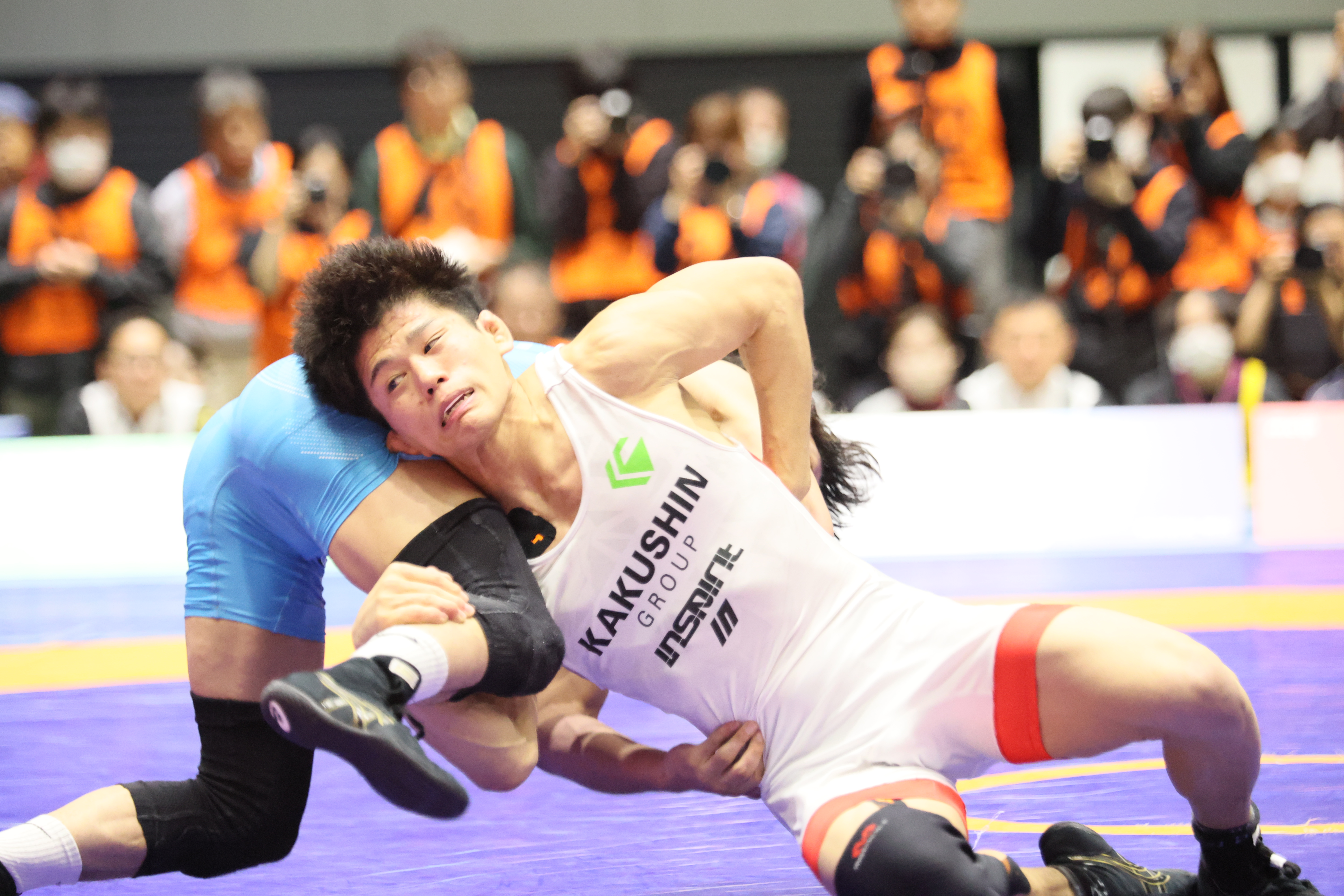 Kotaro KIYOOKA sweeps to the side for a takedown against Takara SUDA in the freestyle 65kg final. (Photo: Takeo Yabuki / wrestling-spirits.jp)
Kotaro KIYOOKA sweeps to the side for a takedown against Takara SUDA in the freestyle 65kg final. (Photo: Takeo Yabuki / wrestling-spirits.jp)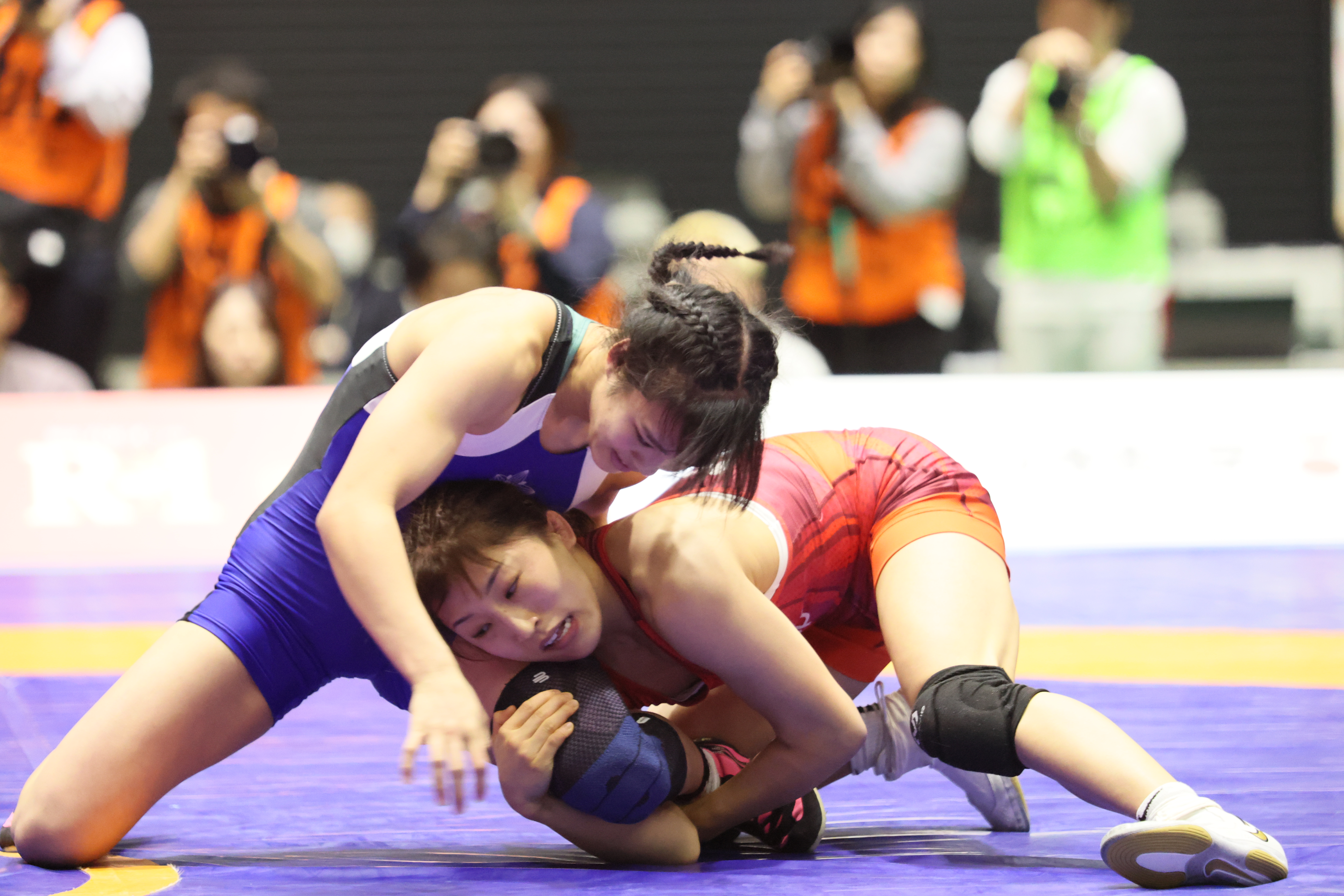 Yui SUSAKI shoots for a takedown against Haruna MORIKAWA in the women's 50kg final. (Photo: Takeo Yabuki / wrestling-spirits.jp)
Yui SUSAKI shoots for a takedown against Haruna MORIKAWA in the women's 50kg final. (Photo: Takeo Yabuki / wrestling-spirits.jp)
Share your thoughts.
Comments